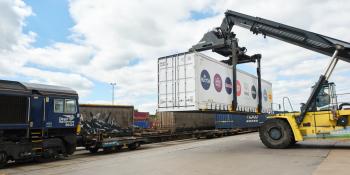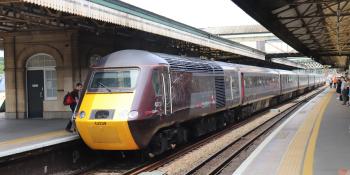News Front– Railtex special

ALSTOM UNVEILED details of its 125mph EMU designed for UK operation at the Railtex trade show.
The manufacturer is seeking to regain a foothold in the UK rolling stock market and has elected to focus on the higher-speed bracket, where it believes there is a suitable gap in the market. The concept design is a modular one, with a train length varying from four to 11 carriages and the option of doors located at carriage ends or at one-thirds and two-thirds along the cars.
Alstom’s reference train is a five-car unit of 23-metre vehicles with end doors, which the company says would offer capacity for around 500 passengers, including 303 seats. With doors at one-thirds and two-thirds along the carriages, this would increase to 370 seats and a total capacity of around 720.
There would be three vehicle types – a trailer car with a cab, a trailer and a motor. A five-car unit would contain three motorised vehicles, with the proportion of motorised vehicles varying between 40% and 67% depending on the length of the train. In terms of the passenger experience, a generous seat pitch, passenger counting equipment and anti-bacterial handles are among features highlighted by the manufacturer, although exact specifications would be determined by the customer.
The company offered the concept to bidders for both the trans-Pennine Express and East Anglia franchises, and is now looking ahead to the West Coast Partnership and East Midlands franchises, with the latter having a potential requirement for new EMUs to operate services to Corby. It also developed a commuter derivative for the West Midlands franchise, which was re-geared for 90-100mph operation. Alstom adds that there is potential for the design to have a 140mph top speed, which could suit an order for additional trains for Southeastern’s high-speed services.
Alstom does not intend to develop a diesel hybrid version, and instead will focus on a pure EMU. However, it does not rule out bringing hydrogen technology to the UK: the company’s emission-free Coradia iLint is being deployed in the Rhine-Ruhr region of Germany, and the main barrier to UK use is availability of suitable hydrogen infrastructure. Alstom says a small order for new trains would likely be built outside the UK, but if the company receives a large order (such as for London Underground’s Deep Tube Upgrade or for HS2) it would manufacture such a fleet at its new Widnes facility. Due to open this summer, this will initially consist of a purpose-built modernisation facility alongside a training academy, but with potential to expand for full manufacture.




